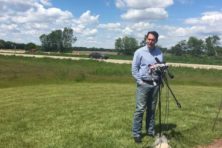Interstate Clarity
- Share
- Tweet
- Pin
- Share
The first 100 or so miles of the trip were silent except for the music coming from the radio. It didn’t matter what song was on, as long as there was some noise in the car. If the music stopped and the inane blather of some obnoxious deejay came on, one of us would unthinkingly reach for the scan button. I think it was probably more of a defense mechanism to avoid the inevitable conversation that would have to take place eventually.
Outside the window, the flat landscape of Illinois flew by. Memphis was still at least seven hours away, and a good portion of that would be spent on Interstate 57. There wouldn’t even be the distraction of referring to the directions to help us delay what was coming.
After watching what seemed like one endless pasture pass by, I decided I might as well just dive right in.
“Cancer.”
I didn’t phrase it as a question, or with any kind of shock, just a sort of mindless echo.
“How long have you known?”
“A couple of months now. I didn’t really want to tell anyone until I got my own head wrapped around the whole thing, if that is even possible. You are the first person outside of my family that I have told.”
An honor that he could have spared me. Sam and I had known each other for what seemed like, by today’s standards, an eternity, about 25 years. There was nothing extraordinary about our story: best friends, there through weddings, births of children (his), divorce (mine), and now I guess that list would include sickness. Looking at it, it sounds like a marriage in itself.
After what seemed like the appropriate pause and a sip of atrocious truck stop coffee, I figured I should say something.
“What now?”
Seemed like a simple enough question. I didn’t handle things like this well, so I wanted to play it safe.
“Not much really. I’m at a point where there really isn’t much to be done. Fight it as best as I can, try to keep comfortable, and wait for the inevitable.”
This last statement made me angry. I don’t really know why; Sam seemed to be okay with it.
“Inevitable? What’s that supposed to mean?”
I probably said this with a little too much anger.
“What do you think? The same ‘inevitable’ that applies to us all.”
It bothered me to be included in his inevitability.
“Aren’t you being a little flippant about this?”
I only used words like “flippant,” “glib,” and “aloof” when I was irritated.
“‘Flippant?’” Sam smiled, indicating he knew me all too well. “What are you so irritated for? Besides, I don’t see it as flippant. I see it as realistic. Why sit and mope about it?”
In our 25 years together, Sam was always the levelheaded one. He would be the one talking his way out of schoolyard fights when I would already be picking myself up out of the dirt. He was the one planning his career, his future, while my main goal was trying to stay in the comfort zone as long as possible. However, even for him this was incredibly relaxed.
“But your wife and Max…”
He nodded calmly.
“They’ll be fine. Grace and I made sure our finances were set long before I even got sick. They will be fine, at least financially. As far as emotionally, we are taking that one day at a time.”
I sat dazed for a little while. I wasn’t quite sure how to approach all of this. It’s not as if I had never dealt with sickness before, or even death for that matter. I had family that had long illnesses and watched as they faded away. But family is different. You learn from a young age that as you get older, your family gets smaller. Relatives who were old when you were young are only getting older. But this was something else. You didn’t expect someone your own age, in your circle, to be staring mortality in the face so soon. It just didn’t happen. It was always us, and we were just going to get older and then cease to be at the same time. It just didn’t seem fair. This is not what I had in mind.
Quietly, not too sure why, I asked, “So how do you, um, you know, feel?”
“Most days not too bad. A little tired, sometimes nauseous. The only steady reminder that I am sick is a constant pressure I feel in my stomach.”
I wanted to tell him that he wasn’t the only one, but I figured levity wasn’t the best option just then. He paused and gave me a concerned look.
“Does this make you uncomfortable? We can change the subject if you want.”
I didn’t answer right away. I was taking it all in along with various thoughts of my own. Thoughts like what will I do now? Who will I take road trips with in the future? And most importantly, how dare he do this to me? After all we’ve been through.
“No, go ahead,” I finally stammered, trying to bury my anger with him. “Whatever you want to tell me.”
He gave me another kind look. That’s Sam for you. Always thinking of everyone else.
“I guess the only thing that bothers me is that from what I have read and what I have been told, it is going to get worse, a lot worse, before it’s over.”
This wasn’t right. Even though Sam and I had known each other for many years, we never really got into any heavy emotional discussions. Sure we talked seriously, things like the birth of his kids, my divorce; but those were things that we didn’t mind, had chosen even. This was an unpleasant topic that had forced itself into our friendship, and I didn’t like it at all. The comfort zone that I had spent my whole life building was now crumbling like a sand castle kicked over by the bully at the beach. And there wasn’t a thing I could do to stop it.
“Why did you still want to go on this trip? Wouldn’t you rather be with your family?”
Sam gave a surprised laugh, shocked that I would even suggest such a thing.
“Are you kidding? And miss this? Sun Studios? Beale Street? Not on your life…or I guess mine would be the more accurate turn of phrase.”
This little attempt at lightening the mood caught me off guard. Even though Sam had a great sense of humor, he also had a lot of tact, and this seemed out of character. He started to fidget with his seatbelt a little, mindlessly adjusting it around his waist. A flicker of a grimace passed across his face, and it looked like he lost a bit of color. I tried to let it pass but couldn’t. At the same time, I got the sense that Sam wouldn’t want my pity either.
“Want me to drive for a while? You’ve been at it for a few hours now.”
There was no answer. For the first time since he had told me the news, I looked directly at Sam and saw something I had really never seen before, not in 25 years. Sam looked weak, tired, but most of all afraid. This man whom I had always seen with a confident stride rushing headlong into whatever life held, knowing that he would meet it face to face, seemed to be cringing in the seat next to me. He shot me a quick glance, managed a meager smile, and fixed his gaze on the long ribbon of interstate before us.
“I can’t do it anymore.”
This only seemed natural.
“That’s fine,” I quickly responded, trying to cover my own fear that was slowly seeping its way in. “We can pull off at the next exit, and I can take over. We can be back home by dinner time.”
Sam gave the steering wheel a sharp blow with the heel of his hand. I jumped a bit and waited.
“Not that! I mean this whole act. I can’t be strong anymore! I can’t be brave anymore! Everyone keeps telling me how courageous I am, how great it is to see me seizing life and getting the most out of it. Why won’t anybody let me be scared? Why won’t they let me be angry? ‘You have to be strong for your family, Sam.’ ‘You have to keep a positive outlook, Sam.’ Why? Why can’t I be mad? I hate what is happening to me, and I hate life right now.”
My own anger and resentment at being cheated of a friend seemed quite petty at the moment. All of Sam’s defenses slipped away and I saw a look of pure anger on his face. I didn’t know what to say at all. Anything that came out would seem clichéd or overly sentimental.
“I don’t know what to say, Sam.”
“That’s exactly why you’re here. I don’t want to you to say anything. I know you won’t say anything. You won’t ask how I am. You won’t ask if there is anything you can do for me.”
I realized that Sam wasn’t merely describing how I act in these situations. He was making a request of me, more of a demand actually. The subject was to be left back on the roadside to mingle with diesel fumes and discarded fast food wrappers. And I was more than happy to oblige. Returning our glances southward, we continued on that river of asphalt in silence, comfortable, angry silence.
Joe Gozdowiak: Character studies have always been interesting to me as a reader and writer. I tried to make the narrator a somewhat unlikable character in his initial reaction and then reinforce that with his return to comfort at the end.
Judge comments:
On a long car trip, the narrator of this story tells a lifelong friend about his battle with cancer. In doing so, he confronts his own emotions, especially his fears, about the disease as well as the long-simmer tensions with his friend. The dialogue is crisp and efficient and sounds like real life.
– David McGlynn


